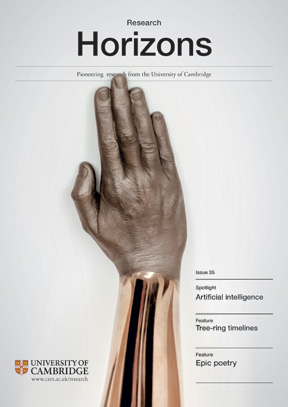
AI: Life in the age of Intelligent Machines
In a new film, leading Cambridge University researchers discuss the far-reaching advances offered by artificial intelligence – and consider the consequences of developing systems that think far beyond human abilities.
The idea that AI can help us understand ourselves and the universe at a much deeper level is about as far reaching a goal for AI as could be
~ Seán Ó hÉigeartaigh
We are said to be standing on the brink of a fourth industrial revolution – one that will see new forms of artificial intelligence (AI) underpinning almost every aspect of our lives. The new technologies will help us to tackle some of the greatest challenges that face our world.
In fact AI is already very much part of our daily lives, says Dr Mateja Jamnik, one of the experts who appear in the film. “Clever algorithms are being executed in clever ways all around us… and we are only a decade away from a future where we are able to converse across multiple languages, where doctors will be able to diagnose better, where drivers will be able to drive more safely.”
Ideas around AI “are being dreamt up by thousands of people all over the world – imaginative young people who see a problem and think about how they can solve it using AI… whether it’s recommending a song you’ll like or curing us of cancer,” says Professor Stephen Cave.
 Much of the excitement relates to being able to leverage the power of Big Data, says Professor Zoubin Ghahramani. Without AI, how else could we make sense of the vastly complex interconnected systems we now have at our fingertips?
Much of the excitement relates to being able to leverage the power of Big Data, says Professor Zoubin Ghahramani. Without AI, how else could we make sense of the vastly complex interconnected systems we now have at our fingertips?
But what do we think about AI and the future it promises? Our perceptions are shaped by our cultural prehistory, stretching right back to Homer, says Dr Sarah Dillon. How we feel about the dawning of a new technology is linked to centuries-old thinking about robotics, automatons and intelligence beyond our own.
And what happens when we come to rely on the tools we are empowering to do these amazing things? Professor Lord Martin Rees reflects on the transition to a future of AI-aided jobs: what will this look like? How will we ensure that the wealth created by AI will benefit wider society and avoid worsening inequality?
Our researchers are asking fundamental questions about the ethics, trust and humanity of AI system design. “It can’t simply be enough for the leading scientists as brilliant as they are to be pushing ahead as quickly as possible,” says Dr Seán Ó hÉigeartaigh. “We also need there to be ongoing conversations and collaborations with the people who are thinking about the ethical impacts of the technology.
“The idea that AI can help us understand ourselves and the universe at a much deeper level is about as far reaching a goal for AI as could be.”
Read more about our AI research in the University’s research magazine; download a pdf; view on Issuu.
Source: University of Cambridge
